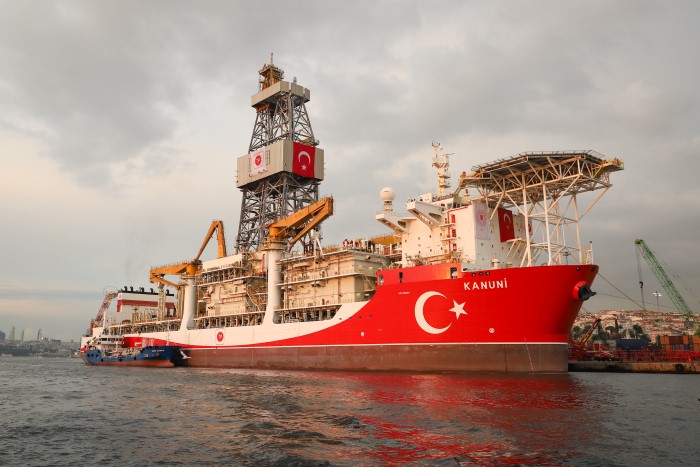Turkey Turns to U.S. Firms while Planning Black Sea Gas Extraction, Official Says
ANKARA (Reuters) — Turkey has shared data on its Black Sea discovery with U.S. energy majors Chevron and Exxon Mobil ahead of possible cooperation in extracting the gas, a Turkish official with knowledge of the matter told Reuters.

Ankara has so far insisted it would develop the estimated 540 billion cubic meters field, its biggest-ever discovery and among the world's largest last year, on its own.
Any formal work with U.S. companies would, therefore, mark a shift in the Black Sea, where Russia also has claims. Turkish exploration in the Mediterranean has raised tension with the European Union and the United States over offshore rights.
If the gas can be commercially extracted, the discovery could transform Turkey's dependence on Russia, Iran and Azerbaijan for energy. President Tayyip Erdogan has said his country was determined ultimately to become a net exporter.
Erdogan is set for his first meeting on Monday with U.S. President Joe Biden since last year's election. Energy cooperation could help ease rifts between the NATO allies, including over Turkey's purchase of Russian missiles.
The Turkish official, speaking on condition of anonymity, said that until now the government had been cool to foreign corporate interest in the gas discovery unveiled in August.
"But now ... Exxon Mobil and Chevron have met with Turkish Petroleum and received data regarding the discovery," the official said, with reference to Turkey's state oil company.
The energy ministry declined to comment on Friday.
A spokesperson said Chevron's policy was not to comment on commercial matters. An Exxon Mobil spokesperson declined to comment.
"The two companies reviewed the technical data and decided to give more time to work in this field together," the official said.
Turkey plans to begin pumping gas from the southwest Black Sea field in 2023, but must first build the offshore pipeline network and processing facilities. The field is expected to reach sustained peak production from 2027.
MORE EXPECTED
Erdogan has twice raised the estimate of gas found, saying last week an extra 135 bcm was in the Sakarya field, bringing the total to 540 bcm.
Turkey's energy exploration team has a good grasp of the geological structure of the field and "is much surer than before that there will be more (gas) discoveries," Energy Minister Fatih Donmez told a panel this week.
The official said Turkey believes there is "much more" gas in the Black Sea. "Cooperation can be established and an agreement could be reached" with the U.S. companies as work there and in the eastern Mediterranean Sea continues, he said.
"Turkish Petroleum has to join a consortium to develop the field for technical and financial reasons, while geopolitics is a major factor in which company it actually chooses," said John Bowlus, researcher at Kadir Has University in Istanbul.
Cooperation with Chevron makes sense given its involvement in Israeli offshore gas development, he added.
And Exxon "always seemed likely" given it operates a Romanian block in the Black Sea, adjacent to Turkish waters and near the Sakarya field, Bowlus said.
Related News
Related News

- Enbridge Plans 86-Mile Pipeline Expansion, Bringing 850 Workers to Northern B.C.
- Intensity, Rainbow Energy to Build 344-Mile Gas Pipeline Across North Dakota
- Strike Pioneers First-of-Its-Kind Pipe-in-Pipe Installation on Gulf Coast with Enbridge
- 208-Mile Mississippi-to-Alabama Gas Pipeline Moves Into FERC Review
- Court Ruling Allows MVP’s $500 Million Southgate Pipeline Extension to Proceed
- U.S. Pipeline Expansion to Add 99 Bcf/d, Mostly for LNG Export, Report Finds
- A Systematic Approach To Ensuring Pipeline Integrity
- 275-Mile Texas-to-Oklahoma Gas Pipeline Enters Open Season
- LNG Canada Start-Up Fails to Lift Gas Prices Amid Supply Glut
- Strike Pioneers First-of-Its-Kind Pipe-in-Pipe Installation on Gulf Coast with Enbridge




Comments